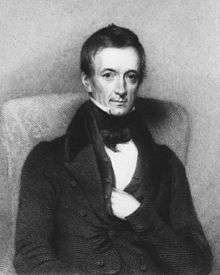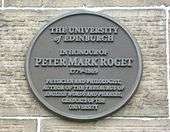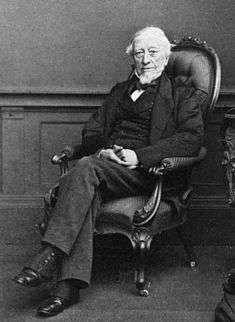Peter Mark Roget
| Peter Mark Roget FRS | |
|---|---|
 Roget by Thomas Pettigrew, 1843 print of portrait, Medical Portrait Gallery | |
| Born |
18 January 1779 Soho, London, England |
| Died |
12 September 1869 (aged 90) West Malvern, Worcestershire, England |
| Resting place |
Cemetery of St James's Church, West Malvern 52°06′45″N 2°20′49″W / 52.1125°N 2.3469°W |
| Residence | London, Edinburgh, Manchester |
| Nationality | British |
| Alma mater | University of Edinburgh |
| Occupation | Physician, philologist |
| Employer | |
| Organization | Various philosophical and literary societies such as the Manchester Philosophical and Literary Society |
| Notable work | Animal and Vegetable Physiology; Roget's Thesaurus |
| Title | |
| Spouse(s) | Mary Taylor (1824–1833, her death) |
| Children | One son and one daughter |
| Parent(s) |
John Roget (d. 1783) Catherine Roget née Romilly |
| Relatives | Samuel Romilly (uncle)[1] |
Peter Mark Roget FRS (UK /ˈrɒʒeɪ/ or US /roʊˈʒeɪ/; 18 January 1779 – 12 September 1869) was a British physician, natural theologian and lexicographer. He is best known for publishing, in 1852, the Thesaurus of English Words and Phrases (Roget's Thesaurus), a classified collection of related words.
Biography

Peter Mark Roget was born in London. His obsession with list-making as a coping mechanism was well established by the time he was eight years old.[2] The son of a Swiss clergyman, Roget studied medicine at the University of Edinburgh, graduating in 1798. His life was marked by several incidents of sadness. His father and his wife died young. His beloved maternal uncle Samuel Romilly committed suicide in Roget's presence. Roget struggled with depression for most of his life. His work on the thesaurus arose partly from an effort to battle depression.[3]
Roget retired from professional life in 1840, and about 1848, began preparing for publication the one work that was to perpetuate his memory. This was the catalogue of words organized by their meanings, the compilation of which had been an avocation since 1805. Its first printed edition, in 1852, was called Thesaurus of English Words and Phrases Classified and Arranged so as to Facilitate the Expression of Ideas and Assist in Literary Composition. During his lifetime the work had twenty-eight printings; after his death it was revised and expanded by his son, John Lewis Roget (1828–1908), and later by John's son, Samuel Romilly Roget (1875–?).[4] Peter Roget was a secretary of the Portico Library in Manchester and it was there that he began to compile his Thesaurus.
Roget died while on holiday in West Malvern, Worcestershire,[5][6][7] aged 90, and is buried there in the cemetery of St James's Church.
Roget in science and technology
Roget was much concerned with medical education but the School of Medicine at the University of Manchester was only established in 1874. He was also one of the founders of the Medical and Chirurgical Society of London, which later became the Royal Society of Medicine, and he was a secretary of the Royal Society. In 1815, he invented the log-log slide rule, allowing a person to perform exponential and root calculations simply. This was especially helpful for calculations involving fractional powers and roots. In 1834 he became the first Fullerian Professor of Physiology at the Royal Institution. He was examiner in physiology in the University of London.
On 9 December 1824, Roget presented a paper entitled Explanation of an optical deception in the appearance of the spokes of a wheel when seen through vertical apertures. This article is often incorrectly referenced as either On the Persistence of Vision with Regard to Human Motion or Persistence of Vision with regard to Moving Objects, likely due to erroneous citations by film historians Terry Ramsaye and Arthur Knight (see Anderson and Anderson below).
While Roget's explanation of the illusion was probably wrong, his consideration of the illusion of motion was an important point in the history of film, and probably influenced the development of the Thaumatrope, the Phenakistiscope and the Zoetrope.
He wrote numerous papers on physiology and health, among them the fifth Bridgewater Treatise, Animal and Vegetable Physiology considered with reference to Natural Theology (1834), a two-volume work on phrenology (1838), and articles for several editions of Encyclopædia Britannica.
He played an important role in the establishment of the University of London; he was a founder of the Society for the Diffusion of Useful Knowledge and wrote for it a series of popular manuals. He showed remarkable ingenuity in inventing and solving chess problems and designed an inexpensive pocket chessboard.
Roget in art and culture
Canadian writer Keath Fraser published a story, "Roget's Thesaurus," in 1982, which is narrated in Roget's voice. Minimalist in style, Fraser's story manages to capture both the associative power of language and many of the salient facts of Roget's life in a text that occupies less than two full pages.
A picture book biography of Roget entitled The Right Word: Roget and His Thesaurus was published by Eerdmans Books in 2014. It was named a Caldecott Honor book for excellence in illustration, and won the Sibert Medal for excellence in children's nonfiction.
Roget was the focus of Randy Wyatt's "Synonymy", which premiered at Minnesota State University's Department of Theatre and Dance in December, 2005. In the play, Gordon, a graduate student, rents Roget's last known residence to inspire himself as he writes his dissertation on the English language and Roget's Thesaurus. The building, soon to be torn down, creates a gateway through which Gordon finds himself traveling back in time and meeting Roget and his daughter, Kate.
Roget also appears in Shelagh Stephenson's "An Experiment with an Air Pump", which concerns scientific ethics. The play takes place in the household of Joseph Fenwick in 1799, and Roget is one of Fenwick's assistants.
Selected writings

- Treatises on Electricity, Galvanism, Magnetism, and Electro-magnetism. London: Baldwin and Cradock; printed by William Clowes. 1832. LCCN 08007072.
- Animal and Vegetable Physiology Considered with Reference to Natural Theology. Part I: The Mechanical Functions. Bridgewater Treatises. London: William Pickering; reissued by Cambridge University Press. 2009 [1834]. ISBN 978-1-108-00008-6. LCCN 06011266.
- Animal and Vegetable Physiology Considered with Reference to Natural Theology. Part II: The Vital Functions. Bridgewater Treatises. London: William Pickering; reissued by Cambridge University Press. 2009 [1834]. ISBN 978-1-108-00008-6. LCCN 06011266.
- Thesaurus of English Words and Phrases (Fourth ed.). London: Longman, Brown, Green, and Longmans. 1856.
See also
- Earl of Bridgewater for other Bridgewater Treatises
- Lexicography
References
- ↑ Murray, T. Jock (September 2004). "Roget, Peter Mark (1779–1869)". Oxford Dictionary of National Biography, online edition. Oxford University Press. doi:10.1093/ref:odnb/24008. Retrieved 21 July 2010.
- ↑ Mallon, Thomas (16 March 2008). "Obsessed (Agog, Beset, Consumed, Driven, etc.)". The New York Times. Retrieved 4 May 2008.
- ↑ Spiegelman, Arthur (28 March 2008). "The man who made lists to fend off depression". Reuters. Retrieved 4 May 2008.
- ↑ Lemco, I. "Roget's Engineering Successor [i.e. S. R. Roget]". Retrieved 18 October 2009.
- ↑ Deaths England and Wales 1837–1983 – lists place of death as Ledbury, and expands "The district Ledbury spans the boundaries of the counties of Herefordshire, Hereford and Worcester and Worcestershire"
- ↑ "Obituary – Dr. Roget, F.R.S". Medical Times and Gazette (London: John Churchill and Sons). II for 1869: 395. 25 September 1869.
- ↑ Kendall, Joshua (2008). The Man Who Made Lists. G.P. Putnam's Sons. ISBN 978-0-399-15462-1.
Further reading
- Anderson, John; Anderson, Barbara (1993). "The Myth of Persistence of Vision Revisited". Journal of Film and Video 45 (1): 2–12.
- Anderson, John; Fisher, Barbara (1978). "The Myth of Persistence of Vision". Journal of the University Film Association 30 (4): 3–8.
- Emblen, Donald Lewis (1970). Peter Mark Roget: the word and the man. London: Longman. ISBN 0-582-10827-6.
- Kendall, Joshua (2008). The Man Who Made Lists: love, death, madness, and the creation of "Roget's Thesaurus". New York: G. P. Putnam's Sons. ISBN 978-0-399-15462-1.
External links
| Wikimedia Commons has media related to Peter Mark Roget. |
| Wikisource has original works written by or about: Peter Mark Roget |
- Works by Peter Mark Roget at Project Gutenberg
- Works by or about Peter Mark Roget at Internet Archive
- The Man Who Made Lists
- Peter Mark Roget (1779–1869)
- History of the Slide Rule
- Fullerian Professorships
- Births and Deaths England and Wales 1837–1983
- Peter Mark Roget; by Craig Thornber
- Winchester, Simon (May 2001). "Word Imperfect". The Atlantic. Retrieved 21 July 2010.
| Academic offices | ||
|---|---|---|
| Preceded by — |
Fullerian Professor of Physiology 1834–1837 |
Succeeded by Robert Edmond Grant |
|